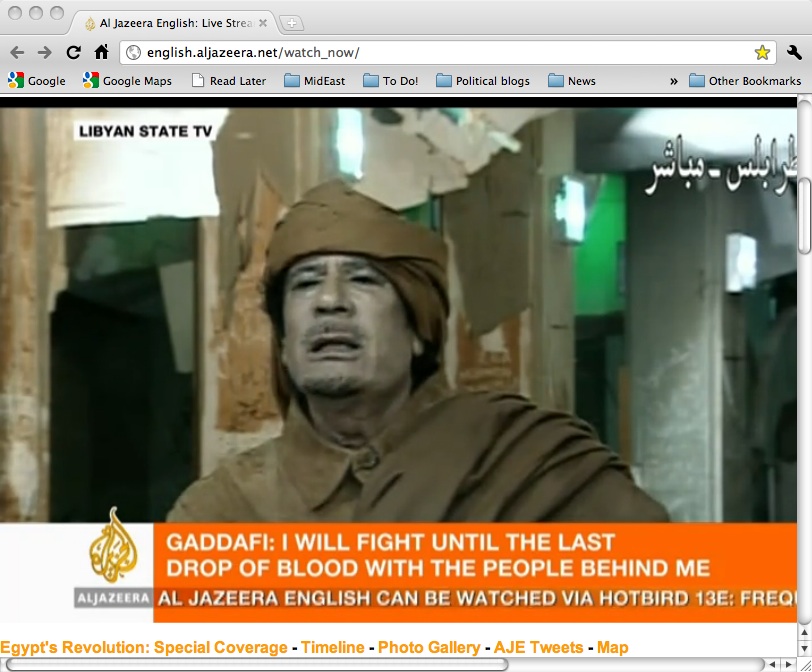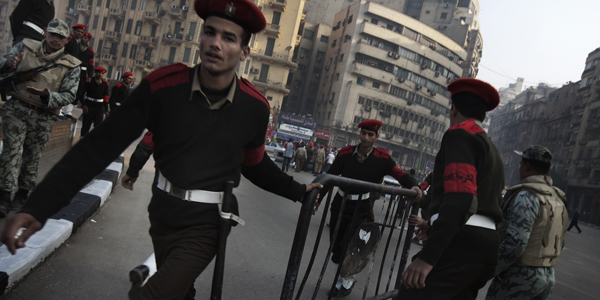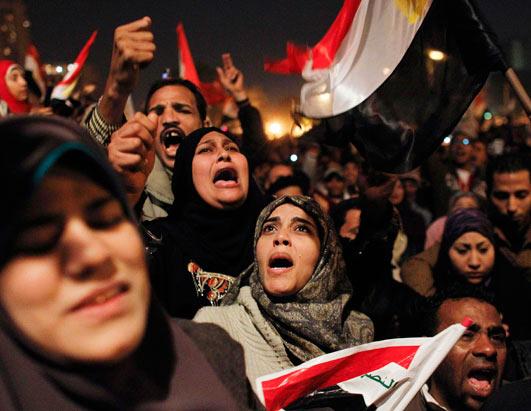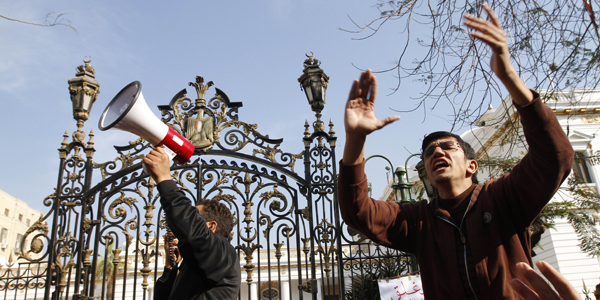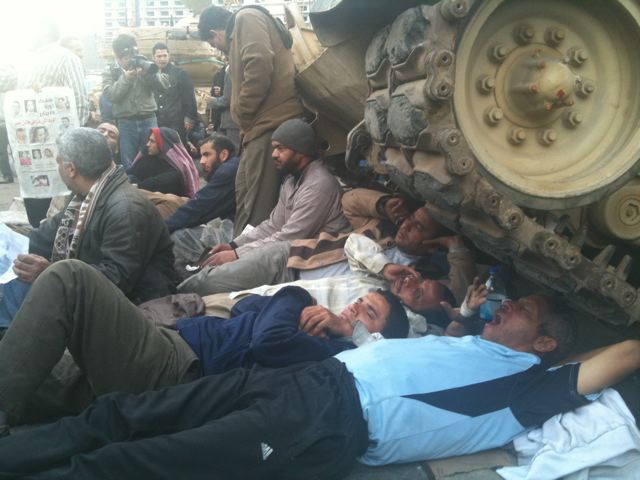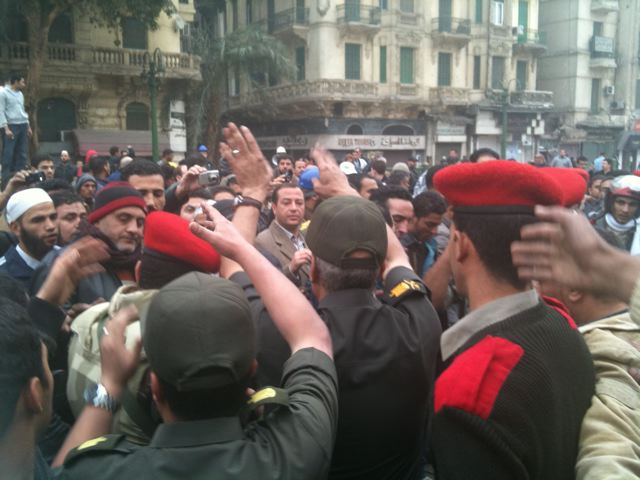Resistance and Revolution
In the weeks since I returned from Egypt, I’ve made a number of previously scheduled talks, originally intended to cover Hezbollah and the most recent developments in Lebanon. I’ve made a stab at addressing the tumultuous change more broadly, as three forces are now competing for popular momentum: revolution (the massive and ongoing regional wave), reaction (the old statist regimes and monarchs), and resistance (the axis of empowerment through armed uprising).
It appears that Salve Regina, the small college in Newport, R.I. that hosted one of those talks, has posted the video online. It is with some trepidation that I post the link.
Some Lessons of the Arab Revolts
In my latest Internationalist column for The Boston Globe, I explore some of the implications of the Arab revolutions for US policy. It will take a long time for American policy makers to grasp the implications of the popular wave sweeping the Arab world, and if history is any guide, the architects of American policy might never actually figure out what happened, why, and how best to respond. One of my favorite analysts and bloggers, Issandr El Amrani at The Arabist, thinks the arguments I make are at best banal, at worst, completely wrong-headed.
Here’s how the column opens:
The popular revolts in Tunisia, Egypt, Libya, and beyond have seized the world imagination like no events since the collapse of the Iron Curtain. Regimes are teetering, dictators have fallen, and unexpected coalitions have managed to conjure street-level power seemingly out of thin air. Tunisians took credit for Egypt’s revolution; Egyptian demonstrators in turn claim they inspired people in Wisconsin and Bahrain.
Much remains uncertain, and even the most experienced observers have no idea who will hold power in the aftermath of these uprisings. But already we’ve learned more in a few short months than we gleaned from decades of careful study about the real power base of Moammar Khadafy and Hosni Mubarak, about the balance among armies and tribes, about the relative power of secular and Islamist activists. We’re seeing the true measure of oil money and the Muslim Brotherhood, of popular anger about corruption, and of the real interest in economic liberalization.
But perhaps the most surprising lessons emerging from all the unrest are even bigger ones — insights that extend well beyond the Middle East, and are forcing thinkers and policy makers to reconsider some basic assumptions that have long guided America’s foreign policy. How much impact can America really have on world events? How do our alliances function at crucial moments? Who really has the potential to initiate and control massive change in modern societies? The surprising answers suggested by the Arab revolts might create new options in the minds of American policy makers looking to advance not only US security and economic goals, but also the causes of human rights, transparency, and democratic governance.
Madness & History
Watching Qaddafi on Al Jazeera right now – like watching Mubarak in Tahrir Square – was like peering down a sinkhole into a previous century. In this hallucination, men from another time, dressed in fashions long discarded, declaim in a wooden language that no longer has any purchase on our psyche. They don’t realize the disconnect. History has moved on. They are blaming provocateurs, satellite television, foreign plots, the Al Qaeda bogeyman. It’s madness! The delusion would be hilarious were it not so lethal.
“If you don’t follow Qaddafi who will you follow?” he says. “Someone with a beard?”
The Gamble for Egypt’s Future
The Atlantic has posted my essay about the next gamble for Egypt’s revolutionaries: Can they sustain pressure on the ancien regime?
The euphoria in Cairo already is already giving way to anxiety as Egyptians contemplate the terrifying task of dismantling Hosni Mubarak’s police state and building an accountable Arab democracy in the image of Tahrir Square.
The old order has been decapitated, but still exerts an undeniable gravitational pull over the entire polity. Thousands or possibly millions of policemen, informants, and clients of Mubarak’s state tremble at the prospect of transparency and, perhaps, retribution. If the protesters want to pursue reform, they will have to consider, and maybe even accommodate, those remnants of the old order.
On the morning before Mubarak resigned, I sat poolside with a group of retired generals at the Gezira Club, a members-only holdover of colonial times. A recently retired general from state security tried to interrogate me about the demonstrators; he was still convinced, against all evidence, that it was a Muslim Brotherhood uprising. The police, he was certain, would soon regain control of the nation. “How will the police regain public trust when they are so hated?” I asked. He couldn’t fathom what I was saying. “The majority of people love the police,” he shouted at me. “They will respect the police because they need the police.”
Old Egypt was on display elsewhere as well, in the patronizing and impatient tone in which the prime minister addressed the public in his first press conference after Mubarak’s downfall, in the capricious manner with which soldiers turned away some people at checkpoints while allowing others to pass, in the air of disgust with which some of Egypt’s millionaires, talking to me over cocktails at the Bodega Bar the day after Mubarak’s abrupt disappearance, dismissed the revolution as a failure that would usher in an anti-business government.
The revolutionaries, gambling as they have every step of the way, have gone for broke and demanded complete systemic reform: a new constitution written from scratch and an interim government purged of the Mubarak family and their Cardinal Richelieu, the spymaster and momentary Vice President Omar Suleiman. Perversely, though, the only way toward that goal was another, bigger, gamble: the revolutionaries have asked a military dictatorship to manage the transition in the hope that a committee of unelected generals who have spent a career defending Mubarak’s order will now willingly write themselves out of power.
The prospect may sound crazy, naïve, even delusional – but then again, three weeks ago so did the possibility of millions of Egyptians embracing civil disobedience and successfully castrating the Mubarak regime.
‘Tomorrow Belongs to Us’
Egypt’s revolutionaries suspect the ecumenical and utopian nature of their wave will bless the next phase of their struggle. So many of the people I talked to on the streets today – before and after Mubarak skulked to his summer palace – already were busy imagining a future in their own indigenous vernacular. Mubarak’s cruelty drove them into a frenzy of rage, but once released from their state-induced torpor and timidity, they found themselves more interested in screaming about the things they wanted, rather than the things they wanted to get rid of.
Mubarak was a spark but also a footnote.
“He treated us all as if we were stupid,” said Leila Abdelbar, a staffer on parliament’s foreign affairs committee. “He underestimated us. He should have respected us.” She was angry, at a father who didn’t take his own children seriously. She also was angry at herself, for having acted for so long like she believed him.
“We have to thank our children for showing us the way,” she said, looking with adoration at her daughter Heba.
She and her friends are conservative Muslims, some of them wearing the full-face covering niqab. They’re not in the Muslim Brotherhood and they’re not interested in an Islamic state; they spoke with longing about a new constitution, a reconstituted judiciary, and a state that provided basic rights: rule of law, education, health and safety.
No one in the crowd used the American democracy vocabulary. They spoke with organic idioms, conjuring huriya, liberty, based on citizens who took their own rights, rather than received them as a leader’s prerogative. “We will take our rights,” many people repeated; they meant that they would demand a new compact, in which they would articulate their needs and if those needs went unmet, they would remake their state.
The specifics varied, and some people still drifted in vague hope for something better. Some talked of their right not to be arrested at will by unaccountable secret police. Some yearned for better schools and hospital care for the poor.
Protest leaders feted the moment but kept planning. “We’ll work until the last moment,” said Basem Kamel, one of the leaders of the Baradei civil reform campaign. Youth leaders were meeting at 1 a.m. to coordinate a clean withdrawal from the square and set negotiating terms for their discussions with the army (Kamel is 41 and balding, but youth is also a state of mind).
I have no doubt there will be reversals ahead, but Egypt has written a new chapter in modern history with utter disregard for all expectations for the contrary – their own as well as those of outsiders. There’s every reason to hope that the same millions of Egyptians who drove a tyrant to flee without firing a shot and without calling for the destruction of anything, and who discarded all their traditional corroded institutions to invent a unified popular front, might now manage the parlous task of writing a new constitution, convincing the military to abdicate to a truly civilian order, and crafting a polity dedicated to serving its own citizens’ conception of their right to justice, liberty and security.
“We did it,” Ziad Al-Alaimy said after lifting me off the ground in a bear hug. “Tomorrow belongs to us.”
It’s a long road ahead, surely, but as many people said: Egypt has learned the way to Tahrir Square. They won’t soon forget it, and let’s hope, neither will their new leaders.
No End in Sight
On Thursday night in Tahrir Square, the crowds were convinced that Mubarak was about to deliver his resignation speech. Generals had told the crowd that on this day, their demands would be met; the high command had convened without Mubarak; and the head of the ruling party had demanded Mubarak amend the constitution and immediately resign.
Activists had already started discussing transitional governments, and warning the military against getting too comfortable. “We now know the way to Tahrir Square,” said Ahmed Sleem, 25, an activist. “We know how to force the military to stay down.”
Ayman Fareh, a tour guide whose son just turned one Ayman, 35, said he had prayed his son would not live another year under Mubarak, and he felt God had listened. “I was just born today,” he exulted. “There was a wall of terror, and it is broken. It will never be built again. We’ll never go back to this dark age. Tahrir Square is always here.”
The celebration turned out to be premature.
By the time Mubarak had made clear he intended to stay in office until September, angry shouts had broken out and thousands had removed a shoe and held it silently, stone-faced up to the screen where the president’s face was projected.
Ahmed Mohammed, 19, a computer student, shouted over Mubarak’s speech. “He will dig his grave himself,” he said, pumping his fist in anger. “He will get our answer tomorrow.”
Nearby other men chanted “He wants blood!”
Organizers warned darkly that violence was now inevitable. “He set the country on fire,” said Ziad Alaimy, one of the organizers. “No one can control the violence tomorrow. Tomorrow I think a lot of people will be killed.”
The dark mood abated within an hour. After midnight, the crowd at Tahrir was still booming at a time when it normally has thinned out to the most dedicated. Men in headbands led chants and songs. Hawkers at the exits entreated those who left to return on Friday.
People heatedly debated whether protesters would be able to take over the state television headquarters or presidential palace, and considered the merits of other ministries.
“Only God can decide what will happen tomorrow – not America, not Israel and not Hosni Mubarak,” screamed, Abdou Shinawi, 27, a perfume merchant, vowing to sleep in the streets until Mubarak left office. “Martin Luther King changed America with thousands of people. We have millions.”
Late in the night, thousands of people poured past the concrete barriers to demonstrate – and set up camp – in front of the Stalinist state television headquarters, an imposing circular tower on the Nile that looks like a fortress even in normal times. Thousands more were on their way to the presidential palace in Heliopolis.
“I wish that it continues to be peaceful,” said Ahmed Abdrabo, 22, a short story writer, grinning at a member of the presidential guard in full riot gear standing two arms’ lengths away, on the other side of a barbed wire fence. “We don’t want it to be transformed into a violent revolution. Tomorrow will not be a good day for Egypt.”
Karma
The lady who answered the Turkish Airlines number at the airport sounded unexpectedly solicitous. Perhaps because I’d just been decked with an unscrupulous $540 data roaming charge from AT&T (their mistake), I was especially charmed.
“I will not charge you to change your ticket even though I am supposed, because you have to Egypt in such a dangerous time,” she said expansively, after a long friendly chitchat.
“Thank you,” I said, genuinely warmed by the gesture.
Then her tone changed. “Unless you’re a journalist,” she said.
Silence.
“You’re not a journalist, are you?” she pressed.
“What if I were?” I said with a short forced laugh.
She chose to interpret my answer as a no, and issued my new ticket home.
Battle of Wills
The Atlantic has posted my dispatch about last night’s expansion of the Cairo protest to the gates of parliament:
On Tuesday, the revolutionaries in Tahrir Square took over the street in front of Parliament and the building where the presidential cabinet meets. A professors’ march took a few unplanned turns, joined a small group of protesters already in front of parliament, stragglers accrued, the military stood aside and – presto – the revolution had another beachhead.
By 10 p.m., hundreds of reinforcements streamed in from Tahrir Square, just around the corner, bringing blankets and tents. They were there to stay.
A government engineer sat smiling on the curb in front of parliament. Beside him a crowd whistled, cheered and beat a drum while a man shimmied up the iron gates of parliament. The sign he taped there read: “Closed Until the Fall of the Regime.”
“The government said we were just squatting in Tahrir Square having a picnic, so we had to move,” said the engineer, whose name was Tarek. At first he declined to tell me his last name, but then he laughed at the absurdity; he’s already on wanted list, and has been warned that if he goes to work at his government job, he’ll be arrested.
“If this revolution fails, Mubarak will hang me by my neck whether or not you publish my name,” Tarek said.
Organizers of Tahrir Square are playing a numbers game. If more people show up each time they call for a big crowd – as happened on Tuesday, which drew perhaps the greatest amount of people since it all began on January 25 – then the revolution advances. That’s their gamble. Several of them said they believe that success required steady escalation. Tuesday, the parliament. Friday, perhaps the state television headquarters or a ministry. Sunday, the police headquarters. And so on. They are hoping to organize major days of action three times a week, a plan that hinges on drawing more and more people each time. So far, popular response has exceeded their expectations at each turn. That’s no guarantee that the pattern will continue, or that the regime won’t use incalculable brute force or brilliant political maneuvering to shift the power balance.
The ultimate wild card is the Egyptian people. Many outside Tahrir Square complain about the demands of the people inside, which many see as too radical, and say they long for business as usual — especially now that Mubarak has promised to resign before the year’s end.
Talking Egypt on The World
Anchor Lisa Mullins interviewed me on Tuesday about the day’s protests in Tahrir Square. You can listen to our conversation here.
Four Scenarios
Last week Mohamed Rifaah al-Tahtawi resigned as spokesman for Al-Azhar, the seat of the Sunni clerical establishment in Cairo. Mohamed Rifaah is twice over an establishment figure. He spent a career in the foreign service as an ambassador and deputy to the foreign minister; after retirement in December 2009, he moved to the office of the grand sheikh of Al-Azhar.
“This youth movement changed our horizon. I didn’t expect it. I underestimated it,” Mohammed Rifaah told me, explaining his decision to renounce his job and join the revolutionaries. “This is a time to take sides, and I have taken sides.”
He invited me to join him on the curb in an alley off Tahrir Square, behind the makeshift hospital. “Welcome to my office,” he joked. “We are all revolutionaries now.”
He outlined four possible scenarios for the current political standoff:
- Soft transition. Under pressure from the United States and from regime insiders, Mubarak passes power to a more palatable member of the establishment and makes real, but incomplete, reforms to the system. Egypt’s foreign policy would remain unchanged.
- Tahrir Square becomes Hyde Park. The revolutionaries lose their connection to society at large and are allowed to continue their protest, but with marginal impact. The regime wins a war of attrition, and returns “with all its savagery, to take its revenge.”
- Tiananmen Square/Paris Commune. The regimes wipes out the protesters and faces no wider nationwide revolt in response.
- Radicalization. The regime gives no ground and in response the revolutionaries resort to force. The regime falls, along with the system it has built, and is replaced by a popular government after a destructive confrontation.
There are surely other scenarios, but Mohamed Rafaah’s breakdown of the alternatives is instructive. In his view, time does not necessarily favor the regime.
Keeping Score
In a sign of how quickly assessments shift, I’m looking here at my notes from yesterday. Thirty hours ago activists in the square were on the defensive, convinced the state had reconstituted and had them on the run. By noon today they were triumphant, and Tahrir Square was so clogged with people it took an hour to walk across it at times.
Here was the grim scene from Monday, when all seemed lost (to some, for a moment).
The world outside the square intruded only sporadically. Undercover intelligence officers circulated filming people with their cell phones, and streams of newcomers walked over the bridge in the afternoon to see if the activists were as bad as they had heard on state television.
“Are they giving out free cell phones?” asked a young math teacher named Fareed, who refused to give his full name and said it was his first, and probably last, visit to the demonstration.
State television has been broadcasting various untruths about the demonstrators, including claims that they receive money and free fast food. “Where is my Kentucky Fried Chicken?” has become a rallying cry for the people staying in the square.
By late afternoon on Monday the numbers inside the square were as high as the previous day, but core activists worried that for every Egyptian attracted for the first time to Tahrir, ten more were being turned off by state propaganda.
“I spend entire nights arguing with my family and posting on Facebook. They have started to turn against the protests,” said Mona Rabie, 28, a human rights worker. Most of her family members dismiss the protesters as radical, although a few have said they would like to take part but fear government punishment. One of her cousins said she was interested in visiting Tahrir but only if Mona would escort her past the military checkpoints. By late evening though she hadn’t arrived. “She’s hesitating. She’s got cold feet,” Mona said. “I think the only way is if I physically go to her house and drag her here.”
“For a while the tide of fear had turned, but it’s started to come back,” Mona said. “The government has too much muscle. I think the people are going to turn against the protesters. They’ve already started.”
She told her uncle that at least a hundred dead had been taken to one Cairo hospital and she had spoken directly with the doctor in charge of the morgue. He didn’t believe her. “If it were true, they would have told us about it on television,” he told Mona.
Still, though, new reinforcements had joined the hard inner core of protesters, spurred on by footage of the violent clashes Wednesday night between government-orchestrated thugs and the Tahrir protesters.
Abdulrahman Mohammed, 34, came to Tahrir for the first time on Monday. “I saw these people on television, and I realized they were better than me,” he said. It was the first time he had joined a protest. “Democracy has a price, and that price is blood.”
Mukhabarat in the Square
The secret police in Egypt usually aren’t very secret. They wear a certain recognizable cut of shabby pants, button-up shirts meant to hang untucked over the belt, and depending on rank a wide-weave sweater or shiny leather jacket.
In Tahrir Square, they parade with the crowds, ostentatiously filming everyone with their cell phones. Some activists who have been arrested and released since January 25 told me their interrogators reference films of them from Tahrir.
No one in the square seems to pay them any mind.
I found this indifference mystifying. Why weren’t the people in Tahrir trying to purge the place of infiltrators, as they had in early days? One organizer explained that there were simply too many, and that it only mattered if they tried to provoke fights. Otherwise, they caused no harm.
Helmy Hassan, a carpenter with no living family members to care for, offered a more compelling explanation. He spends his nights guarding a spur street leading to the square. “The revolution needs people like me,” he said. “That’s why we’re strong. Someone who needs to support his family can be bribed with money.”
Helmy said the scores of people circulating the square, filming with cell phone cameras, couldn’t intimidate demonstrators. “The video is a double-edged sword,” he said. “In the best case, they show the films to their friends and they see what we’re doing. In the worst case, they give the films to state security, and they see that I am defending my country. Let them. It is an honor.”
Under the tanks
At the northern end of Tahrir Square, by the National Museum, groups of men sleep in shifts beneath the treads of the army tanks that mark the northern perimeter of Revolutionary Egypt. Demonstrators allowed the tanks so the army could protect the antiquities in the museum, and ever since the army has tried to move them further.
It’s a particularly tough – and diverse – group of men crammed in close quarters beneath the treads. I talked at length to a doctor from Cairo, a primary school teacher from rural Upper Egypt, and a microbus driver from Giza. They break class and religious barriers, and they have profoundly absorbed the ethos of a new Egypt.
Saif Eldeen, 29, a primary school English teacher, joined the protest on Thursday morning, traveling from his home in Sohag, Upper Egypt. He lied to his wife, telling her he had to file some government paperwork, and drove to Cairo. She wept when he called her from Tahrir Square. “She said, ‘You want to leave me and your three-month old baby to die?’ I told her, ‘God will provide.’”
Saif spoke with a gleam in his eye – common to many of the most dedicated protesters – and said he no longer had anything to lose, and therefore, no incentive to compromise: “If we lose, I will spend the rest of my life in prison, or I will be killed.”
He sported a pronounced prayer bump and a grimy dress shirt. He brought no change of clothes, and planned to stay until the government fell or wiped out the protesters.
Beside him sat the microbus driver from Giza with his three-year-old daughter in his lap. “I come when I can afford not to work,” said the driver, Gamal Moghawery ElShimi, 36. Like many of the dedicated protesters, he worried that the silent majority of Egyptians consider the protests a nuisance or worse. Most of his relatives found the entire protest distasteful, and discouraged him from attending. “They think I’ll end up in prison and it’s not worth it,” Gamal said. “I try to change their minds, but mostly they are unconvinced.”
He wiped his daughter’s nose with a kerchief. He said he brought her along despite the risk so that she would not grow up to live like her parents. “I want her to see and feel what it’s like to defy authority,” he said.
(In the bottom picture, Saif is seated on the left, and Gamal and his daughter on the right.)
The Deep State
Out after curfew again on Sunday night (this time, though, only 9 p.m.) I was returning home after a long day talking to protestors. Plainclothes men frantically waved down my taxi at a joint army-police-neighborhood checkpoint when they saw my foreign-looking face (they looked like police trying to dress like civilians, in a style instantly recognizable as mukhabarat undercover). “Journalist?” they asked. “Camera?”
While a soldier affably thumbed through my passport, a police intelligence officer strode over and emitted a theatrical sigh. “You are coming from Tahrir Square?” he said. “You should know that not everyone in Egypt supports them. We are 80 million people. 1 million cannot make the decisions for us all.”
The soldier, who looked half the intelligence man’s age, interrupted the soliloquy about Egypt’s put-upon security state.
“You can go,” he said, with a smile that struck me as far more sincere than his colleague’s.
Foreigners
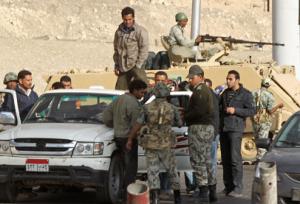 The soldiers had emptied our luggage onto the street and pulled apart the seats of our taxi. The driver was muttering angrily: “You don’t have to destroy my car.” It was four in the morning on Saturday and Cairo was under curfew, but we had decided to risk the checkpoints rather than wait at the airport until dawn.
The soldiers had emptied our luggage onto the street and pulled apart the seats of our taxi. The driver was muttering angrily: “You don’t have to destroy my car.” It was four in the morning on Saturday and Cairo was under curfew, but we had decided to risk the checkpoints rather than wait at the airport until dawn.
The youngest-looking man in the platoon methodically opened every zipper bag and wallet, sniffing my traveling companion’s shampoo and quizzically squeezing the earplugs that came in our Turkish Airlines complimentary traveler’s kit. This turned out to be only the second most invasive search of the night. Triumphantly, he pulled out our books.
Michael had The Girl Who Played With Fire and Eugene Rogan’s The Arabs. Foolishly, I had a brought a copy for friends of my book about Hezbollah, A Privilege to Die.
“What’s this book about?” a military intelligence officer asked me. That’s when he recognized me as the author from the jacket photo. Without a word, he ran to deliver the damning evidence to an even higher officer.
We waited for half an hour, shivering. The soldiers eyed me coldly. None of the usual smiles and chatter I’m accustomed to in Egypt.
A colonel pulled my friend aside.
“You want to know why these soldiers are so jumpy?” he said. “State television has been showing people that look just like your friend there, blaming them for the protests and violence.”
Egyptians have a well-earned reputation for hospitality, which has been a boon to the country’s bread-and-butter tourist trade. Many people seem to enjoy foreigners, normally.
There’s another strand of history that can be summoned though: that of inducing xenophobia in times of crisis. My Greek forebears did it time and again in the turbulent and pogrom-scarred years during which they forged a nationalistic identity after independence in 1821. Egypt has experienced its own periodic bouts of ethnic cleansing since 1919, and a spell of anti-foreigner rioting in the 1950s drove out most of Egypt’s historic Greek community.
This past week’s hysteria about foreigners – engineered by state television and by disingenuous statements from Egyptian leaders laying responsibility for popular unrest on foreign agents – taps into a deep strain of anxiety among Egyptians about their future.
It’s easier to blame foreigners than to confront internal divisions, and today’s rhetoric in Egypt has cast blame far and wide, but, playing on regional political realities, especially on Israelis, Americans, Qataris and Iranians.
In the pre-dawn chill on Saturday, I felt more foreign than I’ve felt at any point in my last eight years reporting in the Arab world. The friendly colonel at the military intelligence checkpoint hadn’t fallen prey to the idea, but his soldiers had.
Our books were returned and we were dispatched into the night.
The most invasive search came an hour later, and just a few hundred meters from our final destination in downtown Cairo. A wild-eyed plainclothes intelligence officer blanched when he saw my Greek passport. “A foreigner? Here? Now?” he screeched. “There is no possible good reason for you to be here.”
He dragged our bags into the storefront commandeered by a sleeping platoon of soldiers. “They have laptops!” he shouted. “Computers! Headphones! Cables!” He flung them every which way across the floor, and woke his bewildered commanding officer, who silently checked our equipment and papers, and cleared us to proceed.
“We must be careful,” he said. “The other day, you know what I found? A Turk with a flash drive. A flash drive! A single flash drive could destroy this entire nation.”
Released from his paranoid late-night fantasy, we finally went home, victims only of a passing, crazy moment. Let’s hope that for Egypt, this state-induced frenzy doesn’t last much longer.
A General’s Unnerving Visit
The Atlantic has posted my piece about Tahrir today.
CAIRO, Egypt — Army General Hassan Ruweini came to the barricades of Tahrir Square on Saturday afternoon for a listening tour. He wanted to hear from the protesters, and then he wanted them to shut up and listen. “It’s time for life to go back to normal,” he said. “You can express yourselves without interfering with others.”
The general wanted to clear the burnt cars, corrugated metal sheets, and requisitioned construction material that had kept police, thugs, and now the comparatively benign military out of the free zone declared by anti-regime activists in Tahrir Square on Jan. 25 and held at great cost ever since.
Now Old Egypt had come to call, bringing a kindler, gentler tone along with the old familiar menacing grip.
“We won’t go until he goes,” the crowd chanted in response, referring to President Hosni Mubarak. Demonstrators refused to let General Ruweini move toward the square, linking arms in a human chain to block his way.
Part negotiation, part restrained violence, part intimidation, the choreographed encounter between the general and the protesters was a microcosm of the Egypt emerging from the turmoil of the last week. A faltering state authority is groping for new ways to impose its will; a hardening popular movement is learning how much power it really wields. They are circling each other, risking deadly clashes at every turn.
In this process, some truths once considered absolute have perished summarily, including the impunity of the police and the infallibility of Mubarak. Others are quietly reasserting themselves: many Egyptians are accustomed to order, state security owns most of the country’s streets, and force often carries the day.
Read the rest here.
Tahrir Today
On my first day in Tahrir Square, General Hassan Ruweini broke through the barricades in one-man charm and intimidation offense, which I’ve written a piece about that should be posted shortly on TheAtlantic.com. Here’s what it looked like from my vantage point as General Ruweini lectured the hostile crowd, and below, the northernmost barricade.
Fresh Air
Terry Gross interviewed me on Fresh Air today about the events in Egypt and their potential to create new space in Arab politics. From the Fresh Air website:
All of our assumptions about the Arab world have been turned on their heads in the past month, says veteran Middle East correspondent Thanassis Cambanis.
“Everything that the experts say and everything that the activists and politicians have taken for granted for a generation, at least, is really off the table,” he tells Fresh Air‘s Terry Gross. “What’s been happening, first in Lebanon and then in Tunisia and now in Egypt and who knows further afield, suggests that new forces have been unleashed and we have no idea where they might lead and what new dynamics they might create.”
On Wednesday’s Fresh Air, Cambanis puts what has been going on in Egypt in a historical context — and explains the rising influence of the political party Hezbollah in the region. He says the recent explosion of popular anger and activism in Egypt opens up the possibility for a new political movement — one not endorsed by autocratic regimes or rooted in Hezbollah’s Islamist ideology.
“There are a lot of people, both dispossessed and powerful, who want dignity but they don’t necessarily want endless war — which is what the Hezbollah school of thought advocates,” he says. “I think they would be hungry for, and very receptive to, an Egypt-centered political movement that talks about Arab empowerment but not endless war.”
Waiting for Mubarak
 Mubarak’s speech tonight eerily evoked the tone of Iraqi Baathists in the spring of 2003. Even after Saddam had fled and American troops had occupied Iraq, I met Baathists in Baghdad who spoke to me with supreme confidence about their natural role running Iraq. They had no doubt that they would remain in charge, one way or another. It took them years to realize how much their nation had changed – and that the Iraqi people didn’t want to be ruled by some reconstituted version of Saddam’s regime.
Mubarak’s speech tonight eerily evoked the tone of Iraqi Baathists in the spring of 2003. Even after Saddam had fled and American troops had occupied Iraq, I met Baathists in Baghdad who spoke to me with supreme confidence about their natural role running Iraq. They had no doubt that they would remain in charge, one way or another. It took them years to realize how much their nation had changed – and that the Iraqi people didn’t want to be ruled by some reconstituted version of Saddam’s regime.
I don’t mean to compare Saddam to Mubarak, only to point out the parallels in the process of regime detachment, teetering, and imminent implosion. It’s possible that Mubarak’s advisers have shielded him from an accurate assessment of the events of the last week, and that he has a distorted picture of the size of the crowds, their sentiment, and the dim reputation of the Egyptian state among its own people.
For three decades, Mubarak has successfully convinced some of Egypt’s elites, and much of the West, that the only choice lay between his dictatorship and Islamic fundamentalists. Mubarak offered continuity and cooperation for the United States, but little else, since Egypt under NDP rule shrank in every indicator (political influence, economic growth, regional influence). The other option in this belabored formulation was a violent, extremist Islamist Egypt ruled by the likes of Ayman Zawahiri.
In reality, however, there was no political space in Egypt whatsoever beyond the platform the regime accorded itself and its organs. The Muslim Brotherhood and the officially sanctioned opposition were only able to function in public within the limited confines permitted by the regime. Consequently, their political development was stymied.
Right now, political space has opened for the first time. The loudest voices within it come from unknown Egyptians, and not from the activists and cadres who have toiled for years in the state-sanctioned opposition. Their preferences are little understood, and perhaps not yet fully developed. They want Mubarak gone, and they seem to want his coterie out as well. They want some form of accountability. Beyond that, we have no idea if they’re interested in forming new political movements and ideologies, or whether they will forge a new way in Arab politics, some platform of ideas distinct from Islamism and secular statist autocracy. If they do, we can guess it will sound less friendly to Washington and Israel than Mubarak’s regime did, and we can also guess it might have a more religious and populist tone. Beyond that, though, there’s little yet to suggest what real representative politics will sound like, or what kind of government might take shape, or what its foreign policy might be.
There is reason to believe, however, that a post-Mubarak and post-Days of Rage Egypt might be able to deliver some improvement in living conditions, morale and perhaps regional leadership to the Egyptian people — if only by dint of trying. And so far, there’s no reason to expect that the mass of protesters, and the inchoate political realm coalescing in its wake, will agitate for war and instability. They seem bent on living better than they have under Mubarak’s rule, not on recreating the 1960s and 1970s.
Things We Don’t Know
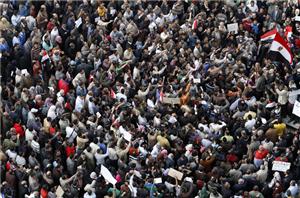 The unraveling of Mubarak’s regime has proceeded at a tremendously exciting pace over the weekend, spawning news, uncertainty, as well as a layer of ideologically-motivated posturing in the U.S. that is only confusing our still-murky view of the situation.
The unraveling of Mubarak’s regime has proceeded at a tremendously exciting pace over the weekend, spawning news, uncertainty, as well as a layer of ideologically-motivated posturing in the U.S. that is only confusing our still-murky view of the situation.
We still don’t have a full picture of exactly what’s happening now in Egypt. We don’t know what’s happening inside the military and inside the top levels of the regime. We don’t know exactly what kind of schemes the police have implemented, although there’s evidence of undercover cops looting and trying to provoke chaos. We don’t know how motivated the protesters are to organize for the long term – although we do know their actions until now have defied almost all expert predictions. We don’t know how many people have been killed and arrested. And we hardly know what’s happened beyond Cairo and Alexandria. We don’t know how it will all turn out.
Given that vast uncertainty, it’s all the more important that we don’t let ideologues exaggerate what we do know, or paint false pictures of the players involved. We do know that almost all of the protests have eschewed the language of Islamism, the Muslim Brotherhood, and the weak establishment opposition parties. We do know that most Egyptians don’t consider Mohammed ElBaradei an inspiring or charismatic figure, and that until this weekend most activists (secular as well as Islamists) viewed his year-long debut in Egyptian politics with disappointment or even frustration. We know that the Muslim Brotherhood has been reluctant to challenge Mubarak’s regime – declining to join bolder secular parties in boycotting last fall’s parliamentary elections, and sitting out the first rounds of the “Days of Anger” this January. Finally, we know that Egypt’s suffocated civil society boasts only a few institutions with national organizational reach: the military, the state security organs, the ruling National Democratic Party, the Muslim Brotherhood, and possibly the Coptic church. Even if they play little or no role in the protests, they’ll be positioned to capitalize most quickly on a post-Mubarak order.
When an authoritarian state collapses, it’s wise to watch players with existing capacity. It’s even wiser to recall that all bets are off. Once-omnipotent secret police can vanish in a day (it happened in Iraq in 2003). New populist parties can quickly emerge. Dormant or smothered institutions like labor unions can quickly reemerge with vigor, and new political parties can spring up to tap public sentiment. Forces like the popular committees organizing to protect Egyptian neighborhoods from looters and the police could easily morph into a potent political force.
So ignore anyone who tries to paint the situation today in Egypt as a simple struggle between a moderate authoritarian regime led by Mubarak and a fanatical Muslim Brotherhood poised to lead Egypt into war with Israel. That regime, as it existed until last week, will be forever changed by the Days of Rage if it survives in some form or another under President Suleiman. Multiple unknowns surround a Muslim Brotherhood that has acted anything but radical in the last three decades, but that’s largely beside the point; the Brothers simply don’t have the numbers or the dynamism to take over this popular revolt. They’ll be a key stakeholder in any new order, but there’s no evidence to suggest they’ll play a dominant role. The military will still be there next month. So will the labor unions, and so will the privileged class that backed Mubarak’s regime and which in Egypt’s next iteration will still channel much of its economic and political power. Egypt’s history of secular nationalism will surely shape events, as will a surging popular will that until last week was almost entirely a mystery.
